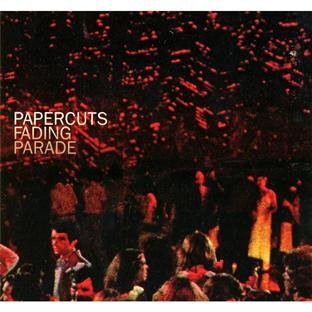
Papercuts
Fading Parade
Release Date: Mar 1, 2011
Genre(s): Pop/Rock, Alternative/Indie Rock, Alternative Pop/Rock, Indie Pop
Record label: Sub Pop
Music Critic Score
How the Music Critic Score works
Buy Fading Parade from Amazon
Album Review: Fading Parade by Papercuts
Very Good, Based on 8 Critics
Based on rating 86%%
Towering floats and performers in exaggerated costumes inch by in between marching bands blasting cover songs that were once played to the point of overkill. For hours on end, people sit on the curb or stand shoulder-to-shoulder just to take in the traveling spectacle. Papercuts’ fourth album and Sub Pop debut, Fading Parade, is nothing like this overwrought, overwhelming assault on the senses.
Based on rating 8/10
Where Papercuts' previous album You Can Have What You Want was as sleepily intimate as a long winter’s nap, the aptly named Fading Parade is as big and bright and misty as spring kicking in. Main Papercuts man Jason Quever worked with his touring band and producer Thom Monahan on these songs, which are ripe with lush touches like “Do What You Will”'s autoharps and the dense organ melody on “I’ll See You Later I Guess,” a piece of chamber pop that rivals Beach House for baroque moodiness. At times, the very bigness of Fading Parade's sound nearly overwhelms Quever's wisp of a voice, but his songwriting is as strong as ever; “Wait Till I’m Dead” feels like a classic pop song that’s been in hiding for a few decades.
Based on rating 7.4/10
Papercuts' Jason Quever rarely raises his voice. The Bay Area native's one-man project began as a folkier relative to friends and tourmates Grizzly Bear and Beach House, bands also making smeary, drifting pop music informed by psychedelic harmonies of the 1960s. But unlike Beach House's Victoria Legrand's vocal smoke or the high-wire melodicism of both Grizzly Bear's Ed Droste and Daniel Rossen, Quever breathes more than he sings, as though he isn't sure whether he wants you to hear him at all.
Based on rating 3.5/5
Every now and again, you encounter a timeworn sound that is actually new, but seems as if it’s been travelling a long time to get here. In the ideal world, where these sounds have matured to the perfect mellow vintage, you’ll hear them secondhand and yellowed, wafted down from a neighbor’s flat on a strong blast of weed. You might even impulsively ask your neighbor — who you never normally talk to — what they’re listening to that evening.
Based on rating 6/10
It’s appropriate that Jason Robert Quever called his band Papercuts, because the name pretty much describes the double-edged effect of his low intensity approach: Papercuts’ hushed, understated lo-fi sound stings just enough to grab your attention, but it never really gets under your skin. On the one hand, the one-man-band’s fourth album, Fading Parade, is full of small gestures that trigger more of reaction than you’d think, staying with you in the most subtle of ways. On the other hand, the San Francisco songwriter’s pleasant and unassuming aesthetic rarely goes beneath the surface, as the atmospheric, often slight songs tend to fade from consciousness before they get stuck in your head.
Based on rating 6/10
Ten years sure is a long time to be drowning in one’s own sorrows. Understandably so, many go through an entire lifetime without a life partner to share one's many triumphs and pitfalls. Jason Quever, one-man band and all around miserabilist, prolongs his search for a perfect soul with a new set of songs that pierce much more acutely. Between modest but disaster-prone portraits, you’d think he holds a masochistic thrill for heartbreak.
Based on rating 6/10
There’s something very unassuming about Fading Parade, Papercuts’ fourth album proper, and first for Sub Pop. It’s neither gaudy nor timid, but there’s a quiet familiarity about Bay Area local Jason Quever’s ten shimmering pop songs. My instant initial association (whether well-founded or not) was actually with Miracle Fortress’s 2007 debut Five Roses, an album that came to soundtrack a summer without any real knowing or say-so on my part.
Based on rating 3/5
If you've never heard of Jason Quever, that might be just the way the San Francisco-based thirtysomething likes it. In interviews, he's prone to say: "I don't necessarily like to be the centre of attention" or "I'm not a very social person" – and this diffident detachment characterises the music he makes as Papercuts absolutely. Listening to Fading Parade, his fourth album, feels peculiarly like eavesdropping: its songs, an acutely knowing blend of 1960s wall of sound atmospherics and 1980s twee indie, ripple and shimmer beautifully but distantly, as though drifting in on a breeze.
'Fading Parade'
is available now

